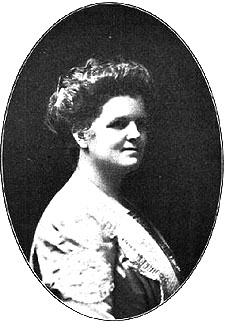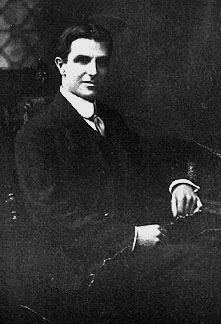| The
story of Holyoke's
only magazine publishing company is unique and at the same time typical
of the city's life and growth. Both vibrate to the keynote of those
lines of Oliver Wendell Holmes', that appear on the title page of every
number of the Nautilus:
"Build thee more stately mansions, oh my soul!
As the swift seasons roll!
Leave thy low vaulted past!
Let each new temple nobler than the last,
Shut thee from heaven with a dome more vast,
Till thou at length art
free,
Leaving thine outgrown shell by life's unresting sea!"
|
On Sunday
morning of December 9, 1910, Holyoke woke up to find that a smart fire
had broken out and gotten enough headway during the night to destroy
the home of one of Holyoke's very prominent families and reduced one of
its flourishing enterprises to a state of utter disorganization. It was
the home of Mr. and Mrs. William E. Towne, and of the Nautilus. Now
people who are in the neighborhood of Oak and Cabot streets are sure to
stop and take note of the very interesting and unusual building that
has risen from the ashes of the old home of the Nautilus. Every day
people are asking what that building is. It is too large for an
ordinary city home, built too lavishly to be an apartment house, and it
does not proclaim industry from its many windows and generous porches.
Strangers usually decide that it is a school house—and that
is not a
bad guess either. For years the Nautilus office has been known as the
high school annex because its editor, Mrs. Elizabeth Towne, insists
that all of her employes shall have been trained in some high school.

Elizabeth Towne
|

William E. Towne
|
The very unusual
home is ideal for its purpose. There is no makeshift about it. It was
planned to be the business home of the Nautilus, and the domestic home
of Mr. William E. Towne. From the stock room to the great fourth floor,
spaces yet undeveloped, the building meets the needs for which it is
used.
Outside is a red pressed brick and limestone with coigns of
white pressed brick. The whole is solid steel and concrete
construction. The gambrel roof is finished with gray asbestos century
shingles. The partitions between rooms are made of gypsum blocks
covered with cement plaster. Upstairs in the living rooms the floor is
overlaid with quartered oak. Even the electric light wires are all run
through metal conduits. The building stands 80x45 feet, the length on
Cabot street, and still space is left to have a terraced lawn on every
side. The high basement, lighted as well as any business office, is
really larger than the ground plan of the house because it extends out
under the several porches. Here are the stockrooms and mailing
department, for besides the Nautilus the Elizabeth Towne Company issues
many publications, including about a score of books.
On
the ground floor one enters from Cabot street by a wide
concrete porch to an entrance hall which leads to the great main office
room where the twenty-three Nautilus girls sit at the many desks, doing
the many things that have to be attended to in a publishing house. If
Elizabeth Towne is proud of anything more than any other thing, it is
of the office girls. She selects them with great care and they look
like a sewing club or a lot of college girls, more than anything else.
Home of the Nautilus
"Our
office
supplies schooling as well as work," says Mrs. Towne. "We teach the
best methods we know for doing all kinds of work believing that
responsibilities honestly discharged and all work efficiently and
good-willingly done make for character, and character makes for success
and happiness and health. Honest work for the worker's sake is the
first principle of our business. We 'graduate' our workers just as a
school does—when a helper reaches the place where she no
longer grows
by doing our work, we are glad to present her with our little 'Well
done,' as a sort of diploma, and pass her on to new opportunities. In
the ten years of our experience with Holyoke girls, we have had over
seventy in our employ, for periods ranging from six weeks to more than
seven years. Many of the finest positions in the city and elsewhere are
now filled by girls who are glad of what they learned with us. Several
are applying efficiency methods in their own happy homes. We are proud
of our girls."
On one side of the entrance to the
Nautilus home is a
pretty reception room furnished in panelled oak and with a cushioned
settee, blue and brown color finish. Opposite is the office of Chester
Holt Struble, managing editor. Back of Mr. Struble's office, occupying
the southwest corner of the building, is the many windowed office of
William E. Towne, editor of American New Life, publisher of several
books and associate editor of the Nautilus. There are filing cabinets
galore, dressing rooms, bubbling fountains, and even a convenience of a
wide hat rack for the pretty millinery of the Nautilus girls.
Much for a brief story of the fine home of the Nautilus,
which was ready for business and living within ten months from the day
the flames destroyed the old building. To accomplish all this meant
wise planning and much labor. W.B. Reid, as architect, put Mrs. Towne's
ideas into formal plans. F.H. Dibble was the general contractor.
Preston & Moore did the electric wiring, putting all wires in
metal
conduits, and including a house telephone system by which every room
was put in touch with all the other rooms. C.F. Sullivan did the
plumbing, which is as perfectly planned from bubbling drinking
fountains to fine bath rooms as could be done. The decorating was by
Johannis, and Hall of Springfield put in the electric light fixtures.
When all is told about the building it
only typifies what
the building stands for. Curiously enough Holyoke knows less about the
Nautilus than does Boston or New York or Chicago or Spokane or Denver.
Hardly a week passes but someone from afar, traveling in these parts,
stops off a train to look up the Nautilus and Elizabeth Towne herself is
of course a well known personality in Holyoke, but it is not so generally
understood that almost 50,000 of the Nautilus are mailed out of Holyoke
each month, besides the big subscription book business done by the
firm. It is far and away the largest customer of the Holyoke
postoffice. It takes four girls a whole week to wrap up a single issue
of the Nautilus. All this has grown from the most modest beginnings.
Three thousand five hundred copies of
the first number of
the Nautilus were printed at a cost of $25. It was then a tiny
four-page paper printed in Portland, Ore.
In May, 1900, Mrs. Towne brought the
Nautilus to Holyoke.
The first issue if the Nautilus made in Holyoke, June 1900, was 4,5000
copies, and the printer's bill was just $36.93, including the wrapping.
At this writing 47,500 copies of the
Nautilus have been
printed and distributed for the current issue at a cost of $2,000. This
little four-page paper has grown to be a handsome illustrated magazine.
Mrs. Towne is the editor of the
Nautilus and inspires its general policy.
William E. Towne is the associate
editor and writes most of
the Nautilus advertising, in addition to publishing his own quarterly,
American New Life, and carrying on his regular work of selling books by
mail.
Mrs. Towne's son, Chester, who carried
the first issue of
the Nautilus down to the postoffice, on his shoulder, is now associated
with the Nautilus as Chester Holt Struble, managing editor and
advertising manager.
These three form the trinity that is
evolving the bigger,
better, brighter Nautilus, exponent of New Thought, self-help, and
human efficiency through self-knowledge.
Recently the Nautilus business has
been incorporated as the
Elizabeth Towne Company, a close corporation. The Elizabeth Towne
Company owns the magazine and carries on all the book and subscription
business connected with the publishing of the Nautilus.
There is hardly a civilized or
uncivilized country on the
globe where the mails of the Postal Union penetrate that Nautilus
doesn't visit regularly. Even to the Fiji Islands and to Macedonia. His
Excellency Wu Ting Fang is a Nautilus subscriber. In English speaking
countries the Nautilus goes to the homes of all sorts of people,
proletariat, bourgeoisie, and the aristocrat. There are many persons of
title on the list. A great many of the subscribers grace the pages of
"Who's Who in America," and the "International Who's Who." A Chief
Justice of the Supreme Court of one state sends Nautilus to seven of
his friends. One at least of the great multi-millionaires studies it
regularly and recommends it to his friends. Down in New Orleans a poor
little woman who owns a tiny vegetable stand in the big market finds
Nautilus her solace and inspiration. And rich man, poor man, beggar
man, thief, doctor, lawyer, merchant, chief, fill up the Nautilus
subscription ranks between.
Yes, thief. There are several convicts
in state prisons who are finding self-help through Nautilus.
The Nautilus work has grown and spread
and attracted the
attention of many famous people, some of whom have become its
contributors. Ella Wheeler Wilcox and Edwin Markham, Anne Warner,
Edward B. Warman, A.M., Horatio W. Dresser and Orison Swett Marden are
among the well-known helpers who contribute some of their best work to
the Nautilus. William Walker Atkinson, one of the leading New Thought
writers of the world, has joined the staff of writers.
While the Nautilus has been thus
growing and expanding its
editors' books have been selling by the hundreds of thousands. Mrs.
Towne is the author of thirteen books of various sizes, and the
publisher of many more. One of her own books has reached a sale of
nearly a hundred thousand copies, which is most remarkable for a work
of this kind. "Experiences in Self-Healing," which contains the life
story of the author, covering a period of twenty years, has also had a
tremendous sale.
Besides her editorial, book making and
home making life,
Mrs. Towne is a lecturer of note, having crossed the continent on
lecture tours. She has a generous paragraph in "Who's Who?" the
standard American Hall of Fame. She is a member of the International
Lyceum Club. In Holyoke she is deeply interested in local philanthropic
work, with a special fondness for the Holyoke Boys' Club.
Her twelve years' residence here has
made her an ardent
Holyoker, and a lover of all New England. People who meet Mrs. Towne
are at once impressed with the qualities that have created her success.
She has a message and the brains to present it well. She has high
courage, rare judgment, a most attractive personality and with all
these an immense capacity for hard work. These qualities mean success
in any path in life. They have led to the practical application of the
motto of the Nautilus and caused for it the building of "more stately
mansions."
|



